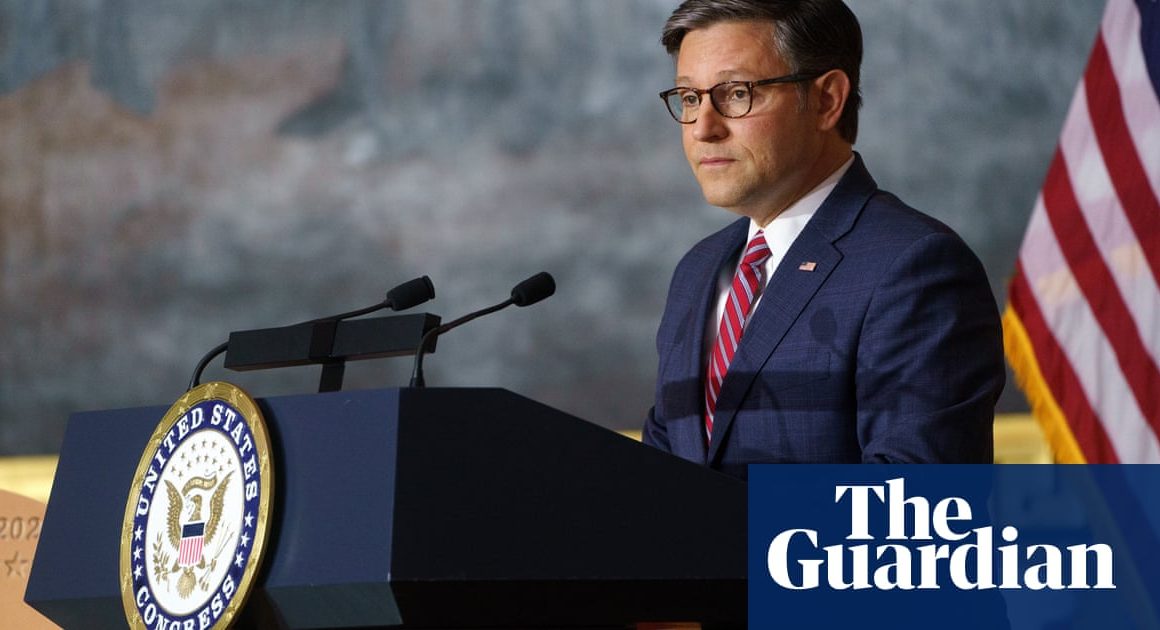Lucy Powell confirms MPs will vote on on means-testing winter fuel payments on Tuesday next week
In the Commons Lucy Powell, the leader of the Commons, has confirmed that MPs will vote on the regulations to means-test the winter fuel payments on Tuesday next week. It will be the first item for debate, which means the vote should come mid-afternoon.
Powell also made herself popular with MPs by announcing Commons recess dates for all the holidays until next summer. Chris Philp, her Tory shadow, said the dates were very helpful, and that she had saved him booking a flight he would otherwise have to cancel.
Key events
Downing Street said the head of the new Border Security Command would be named within weeks. Speaking at the morning lobby briefing, the PM’s spokesperson said:
One of the first things that the Government did was to launch the recruitment campaign for the for the border security commander.
We obviously want to have the most skilled person possible in the role.
The process been thorough, and we expect to provide an update on that in the coming weeks.
In the meantime, we’ve already put an extra 100 officers into the National Crime Agency to work with partners across Europe, on top of the 50% uplift in NCA officers stationed at Europol.
Reed promises review of how water industry operates – but rules out nationalisation
Steve Reed, the environment secretary, has ruled out nationalisation of the water companies to fix the sewage scandal.
Speaking to journalists in Putney, after delivering a speech on water reguation (see 11.48am), Reed said that this option is not on the table for a so-called radical review and restructuring of the water system which he announced.
He said today’s legislation to jail water bosses who cover up pollution and ban bonuses for CEOs of failing companies is just the start and there is going to be a radical review of the water sector to make it financially sustainable and end sewage spills for good. The review will involve extensive consultation, he said.
We will ensure the framework that underpins our water system achieves long term stability, and we will invite views from a range of experts from environmental to public health, consumers, economists and campaigners.
Further details for this review will be laid out in the autumn.
Is government’s crackdown on polluting water bosses really tough enough?
Steve Reed, the environment secretary, has given a speech this morning on his plans to tighten the laws on water regulation. The press release from the Department for Environment, Food and Rural Affairs is here, and here is Helena Horton’s preview story from last night.
In the light of the report, a reader asks:
Andrew the announcement re water bosses from Steve Reed looks pretty strong to me, but Feargal Sharkey, who even campaigned for Labour, says it’s a missed opportunity . What am I missing?
Helena Horton is better placed to respond than me, and so I asked her. She sent me this.
Feargal thinks this because he has been calling for Ofwat and the Environment Agency to be reformed and Labour is not doing this. They do not use their current powers and have incentivised water companies not to invest, while turning a blind eye to large dividend payments to shareholders. Asking Ofwat and the EA to use their existing powers doesn’t require new legislation, nor does doing things like taking away the Tory-introduced growth order which asks Ofwat to prioritise growth over the environment.
He thinks that the government should be more serious about putting failing water companies in special measures, and that if they are put in special measures then the shareholders who have made money out of the mismanagement of water companies should pay for it, not the taxpayer. In fact, this new bill is going to make it so operating costs on special administration get passed to billpayers if the sale of the water company does not cover these costs – and if Thames is sold for a very low price after going into special administration and this may need to happen.
In terms of jailing water bosses, the terms of reference for the data disclosure they would need to meet have not been set so we don’t know in which exact circumstances they would be jailed. It’s unlikely any will be jailed, this is just a measure for transparency. And crucially, they will not be jailed for illegally discharging sewage but for covering up discharges, so if they are transparent they do not face these personal criminal charges. It’s unlikely anyone will end up in prison.
And in terms of banning bonuses, the government is only banning them if the water company fails to meet environmental, fiscal and consumer targets. The government has not set out terms of reference for this either. At the moment, CEOs can be paid bonuses and given top marks by the EA even if they are found to recklessly dump sewage. So we need to see the terms of reference before we know how effective this will be.
There’s no doubt that a lot of this is good news, but most campaigners think this is tinkering around the edges. They think the regulators need funding and to be beefed up to properly crack down on this. Fines need to be levied which are high enough that water companies cannot afford not to invest in ending pollution. Ofwat has been worried about doing this as it could force companies into failure and therefore special administration if they are fined out of existence but arguably a company that cannot afford to operate within the law shouldn’t be allowed to continue operating.
Lucy Powell confirms MPs will vote on on means-testing winter fuel payments on Tuesday next week
In the Commons Lucy Powell, the leader of the Commons, has confirmed that MPs will vote on the regulations to means-test the winter fuel payments on Tuesday next week. It will be the first item for debate, which means the vote should come mid-afternoon.
Powell also made herself popular with MPs by announcing Commons recess dates for all the holidays until next summer. Chris Philp, her Tory shadow, said the dates were very helpful, and that she had saved him booking a flight he would otherwise have to cancel.
Ruth Davidson backs Russell Findlay for next Scottish Tory leader

Libby Brooks
Big news in the race to become the next leader of the Scottish Conservatives – which has been attracting a bit less attention than the UK leadership contest over the summer but has had its fair share of shenanigans, back-biting and drop-outs nonetheless.
Ruth Davidson – who rejuvenated the Scottish Conservatives and led them to electoral success in the 2010s – has urged Scottish members to support Russell Findlay, a former investigative journalist and currently justice spokesperson.
Findlay, who has proved a popular and outspoken MSP since his election in 2021, was already the favourite of senior Tories but has found this more of hindrance after allegations emerged that outgoing leader Douglas Ross had plotted to install him. Indeed, this so infuriated the other candidates that one, Meghan Gallacher, resigned as Ross’s deputy.
The other four candidates – Murdo Fraser, Jamie Greene, Liam Kerr and Brian Whittle – issued a joint statement expressing their concerns for the fairness of the contest. Since then, three of them have dropped out and fallen in behind Fraser, a party veteran who stood against Davidson in 2013 on a platform of splitting the Scottish Tories from the UK party.
With hustings now begun in earnest, the ballots going out early this month and the winner announced on Friday 27 September, Findlay has won the coveted Davidson endorsement – indeed, he launched his campaign last month with a promise to inject “the Ruth Davidson mojo” back into the party. He already has the support of all five Scottish Conservative MPs and 12 MSPs.
Writing in the Daily Mail, Davidson says:
Russell Findlay ticks all the right boxes. He became an MSP after a 30-year career working as a fearless and successful investigative journalist. That experience ensures he has the natural understanding of the concerns of mainstream voters which is an essential part of effective leadership.
He speaks from the heart and has the strength of character necessary both to make the hard calls and to build, lead and motivate a winning team.
Over the past weeks he has clearly demonstrated he has the ideas, deeply rooted in traditional Conservative values, which can provide that positive and uplifting vision for the future of our party and country.
A reader has got a question about the private members’ bill ballot. (See 10.10am.)
@Andrew: how is the ballot for deciding which MPs get to propose private members bills decided? Would the Tories have all needed to line up behind one or more candidates to have a chance of making the top 10 or 20? Or did all the other parties lock them out by voting en bloc for anyone but a Tory MP?*
*There is a third option: the Tories are sulking, but that’s their problem.
Good question. They choose the top 20 by pulling balls out of a big glass jar. The balls are all numbered, and MPs are allocated a number. It’s just like a tombola.
To add to the fun, it is televised too. You can watch the re-run here.
And here is a clip.
Kemi Badenoch says Labour’s decision to suspend some arms sales to Israel shows it has given in to ‘mob’
Another Tory leadership candidate, Kemi Badenoch, was also busy on social media last night. She posted a long thread on X escalating her criticism of the government over its decision to suspend some arms exports to Israel. It starts here.
🧵1/ It is not true that the removal of Israel arms licenses was a legal decision. Keir Starmer should not hide behind this fig leaf. It was *very* much a political decision. #PMQs
I know this, because as Trade Secretary, responsible for arms licenses, I saw the legal advice.… pic.twitter.com/H9HeZIw8kY
— Kemi Badenoch (@KemiBadenoch) September 4, 2024
Badenoch makes two main claims.
-
She claims that Keir Starmer was wrong when he told MPs at PMQs yesterday that the decision to suspend some arms sales to Israel was legal, not political. (In some respects Badenoch has a point, because these decisions inevitably have a political dimensions, but she ignores the fact that her government allowed all arms exports to continue because they were willing to ignore legal advice saying they might be used in breach of international humanitarian law.)
1/ It is not true that the removal of Israel arms licenses was a legal decision. Keir Starmer should not hide behind this fig leaf. It was *very* much a political decision. #PMQs I know this, because as Trade Secretary, responsible for arms licenses, I saw the legal advice. So why has the decision been made? It’s because Labour are scared…
-
She claims that, in making the decision to end some arms sales to Israel, Labour was giving in to “the mob”. She says her government ignored pressure from protesters to halt arms sales, and claims “we are now governed by a party that is not brave enough to face down intimidation and lobbying”. (This claim ignores the possibility that perhaps ministers were actually in favour of suspending arms sales in accordance with legal advice.)
This is why I am very concerned about the Prime Minister’s pretence today that this was a legal decision. It isn’t. It is VERY political. The Labour government has once again prioritised the mob over UK interests, making politically charged foreign policy decisions that lack legal reasoning and weaken our position in the global fight against Iran and her terrorist proxies.
Labour’s Kim Leadbeater comes top in ballot for private members’ bill, with no Tory in top 20
Here is the full list of the 20 MPs who have won a slot in the private members’ bill ballot.
1) Kim Leadbeater, Labour (Spen Valley)
2) Max Wilkinson, Liberal Democrats (Cheltenham)
3) Dr Roz Savage, Liberal Democrats (South Cotswolds)
4) Clive Lewis, Labour (Norwich South)
5) Josh MacAlister, Labour (Whitehaven and Workington)
6) Dr Scott Arthur, Labour (Edinburgh South West)
7) Jim Allister, Traditional Unionist Voice (North Antrim)
8) Peter Lamb, Labour (Crawley)
9) Alex McIntyre, Labour (Gloucester)
10) Andrew Ranger, Labour (Wrexham)
11) Jake Richards, Labour (Rother Valley)
12) Tracy Gilbert, Labour (Edinburgh North and Leith)
13) Linsey Farnsworth, Labour (Amber Valley)
14) John Grady, Labour (Glasgow East)
15) Rachael Maskell, Labour (Co-op), (York Central)
16) Ruth Jones, Labour (Newport West and Islwyn),
17) Dr Danny Chambers, Liberal Democrats (Winchester)
18) Sarah Owen, Labour (Luton North)
19) Wendy Chamberlain, Liberal Democrats (North East Fife)
20) Dr Rupa Huq, Labour (Ealing Central and Acton)
The order is important. All the MPs on the list will get the chance to present a private member’s bill to parliament (which means have it put down on the order paper for a first reading, which is just a formality). This will happen on Wednesday 16 October.
But only the top seven MPs on the list are guaranteed a full Friday where their bill will be debated. These are the ones with a realistic chance of getting a bill through the Commons, provided there is a majority for it, because time will be available. MPs who are lower down the list can get a bill through, but only if it is uncontroversial and likely to be rushed through quickly without any backbencher wanting to hold up the debate.
Interestingly, there are no Conservative MPs on the list. That might just be bad luck. But it is probably also a sign that many Tory MPs decided not to bother taking part in the ballot, perhaps because they are preoccupied with the leadership contest and perhaps because they think, given there is a massive non-Tory majority in the Commons, they have no chance of getting a law passed anyway.
Keir Starmer has said that he would support legislation to allow assisted dying through a private member’s bill and the MPs at the top of the list will come under pressure from campaigners to choose assisted dying as the topic for their bill. (When they enter the ballot, they don’t have to say what bill they will table if they are successful.)
UPDATE: I have changed a sentence in the original post so it now says only the top seven MPs on the list are guaranteed a full day for their bill to get a second reading. (Originally it said it was normally around six MPs who get a reserved slot.) A Commons spokesperson later said that there are 13 Fridays set aside for private members’ bills. On the first seven Fridays, second reading debates come first (which means seven bills get a clear run at getting a second reading). On the other days, MPs start by dealing with the remaining stages of private members’ bills that passed second reading. If there is time, bills below the top seven may get debated. But normally most of the bills that don’t make the top seven run out of time.
Robert Jenrick claims case for Tory members to get more say in how party run now ‘unarguable’
Robert Jenrick, who came top in the first round of voting by MPs in the Tory leadership ballot yesterday, paid tribute to Priti Patel in a post on X last night.
My friend @pritipatel is a relentless champion for Conservatism whose experience will be invaluable as we rebuild.
Her campaign means the case for party reform is now unarguable.
We must democratise the party, empower members and grow our membership. https://t.co/xlydSYfhaM
— Robert Jenrick (@RobertJenrick) September 4, 2024
My friend @pritipatel is a relentless champion for Conservatism whose experience will be invaluable as we rebuild.
Her campaign means the case for party reform is now unarguable.
We must democratise the party, empower members and grow our membership.
Patel campaigned on a platform calling for party members to have more say in how the party is run. Given that she came last in yesterday’s ballot, there is no logical reason for Jenrick to say her campaign has made the case for party reform “unarguable”. Quite the opposite, the result implies. But there is an obvious political reason why Jenrick is saying this. He is angling to pick up votes from some of her MP supporters, and perhaps an endorsement from Patel herself.
The Labour MP Kim Leadbeater has come out top in the Commons private member’s bill ballot, PA Media reports. The MP for Spen Valley in West Yorkshire will now have the first chance among MPs to bring forward a Bill of her choice, which she would like to become law.
Some 458 MPs entered this session’s ballot.
In her inteview with Times Radio this morning Angela Rayner, the deputy prime minister, was also asked about her dancing antics on holiday in Ibiza last week, where film of her behind the DJ deck at a club made the news, and generated sneering from some of the more unhinged figures on the right. Rayner replied:
People have an opinion, but you know, if I’m on holiday for a couple of days, I’m on holiday for a couple of days … I think we’ve all had a dance at one time in our lives and I don’t know, it’s subjective to whether or not I can dance or not!
And on Sky News she said:
I take my job really seriously, and I’m always in Parliament and I’m always doing what needs to be done and I’ll continue to do that.
I’m working class, I like a dance, I like dance music. I got criticised for going to the opera if you remember – I was a champagne socialise for going to the theatre.
Grenfell report highlights need for ‘cultural shift’ to ensure social tenants treated with more respect, Rayner says
Good morning. Angela Rayner, the housing secretary and deputy prime minister, has been doing an interview round this morning. She has a lot in her portfolio but, understandably, most of the questions were about the Grenfell Tower fire report out yesterday. Here are some of the main lines.
I think the people of Grenfell were dismissed and not listened to and were not empowered as tenants.
And I think that we’ve got to make sure that greed and profit is not put above safety …
There is a total imbalance for tenants at the moment, and social tenants in particular have a stigma attached to them.
And as someone who was a social tenant all of my childhood and into my adulthood, I completely appreciate that there is a culture in this country where they’re considered lesser people, and that’s disgraceful.
-
She said she wanted to the police and the Crown Prosecution Service as “as quickly as possible” to bring people to justice over the fire, but she said it was an “incredibly complex investigation”.
At the moment, there’s £5bn that’s available for remediation, so I don’t accept that the money’s not there. And these companies, the people that own these buildings, have financial resources as well. I don’t accept that there is not the money to do this remediation … There’s no excuse to not do this work now.
I am determined to make sure that our remediation acceleration plan comes forward with, if we need changes to legislation, which I believe we will, especially in light of the report findings that we have got now which we will have to go through and to ensure that we do everything we possibly can to speed this up.
Here is the agenda for the day.
9am: Nusrat Ghani, the deputy speaker, reads out the names of the MPs who have won the right to bring forward a private member’s bill in the private members’s ballot. Twenty MPs get selected, but only the top half dozen or so have a realistic chance of being given enough time to get a bill into law.
10.30am: Steve Reed, the environment secretary, gives a speech on the government’s plans to crack down on the water industry. He is also publishing the water (special measures) bill.
After 10.30am: Lucy Powell, the leader of the Commons, takes questions in the Commons about next week’s business.
11.30am: No 10 holds a lobby briefing.
After 11.30am: MPs debate the second reading of the Great British Energy bill.
Noon: John Swinney, Scotland’s first minister, takes questions from MSPs.
Lunchtime: The Cabinet Office publishes its House of Lords (hereditary peers) bill, that will remove the right of the 92 hereditary peers still in the Lords to be there.
If you want to contact me, please post a message below the line (BTL) or message me on social media. I can’t read all the messages BTL, but if you put “Andrew” in a message aimed at me, I am more likely to see it because I search for posts containing that word.
If you want to flag something up urgently, it is best to use social media. I’m still using X and I’ll see something addressed to @AndrewSparrow very quickly. I’m also trying Bluesky (@andrewsparrowgdn) and Threads (@andrewsparrowtheguardian).
I find it very helpful when readers point out mistakes, even minor typos (no error is too small to correct). And I find your questions very interesting too. I can’t promise to reply to them all, but I will try to reply to as many as I can, either BTL or sometimes in the blog.










